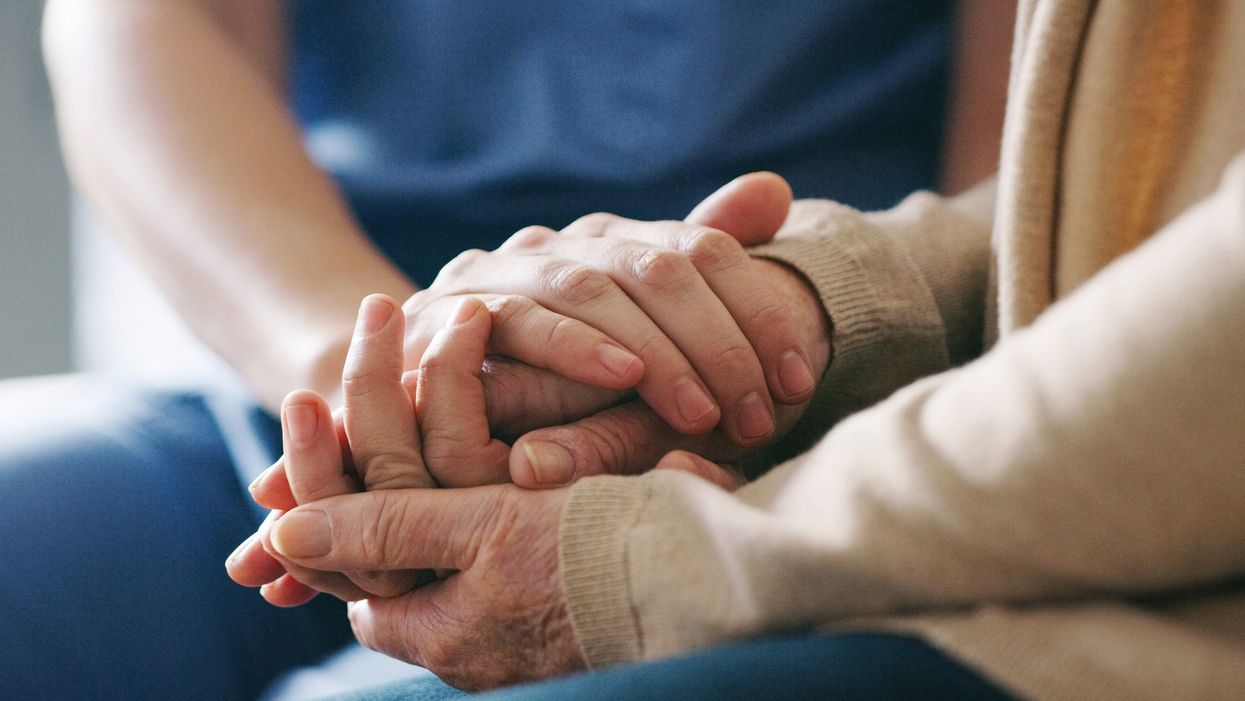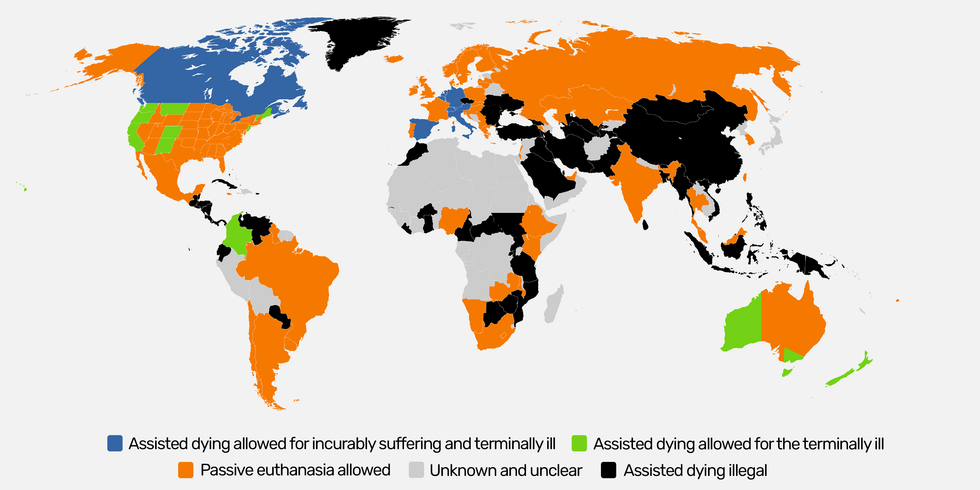
A map from Humanist UK charts the different legal stances on assisted dying from all over the world
A new map shows the difference in laws on assisted dying around the globe.
Humanists UK have found that more countries have passed assisted dying laws – affecting over 250 million people – since MPs last debated proposals on changing the law in 2015.
The research also uncovered two predominant models of assisted dying internationally.
The first provides assistance to those who have six or fewer months left to live – found in New Zealand, and some parts of the United States and Australia.
While the second enables choice for both those who are terminally ill and incurably suffering.
This model can be found in Austria, Canada, Belgium, Italy, Germany, Luxembourg, the Netherlands, Spain, and Switzerland.
A similar bill is also currently under consideration in the Republic of Ireland.

Elsewhere, both euthanasia and assisted dying are illegal in the UK.
Helping someone to end their life is currently a criminal offence and carries a maximum penalty of 14 years imprisonment in England and Wales.
Though terminally ill patients in the UK do have the right to refuse treatments that might extend their life. Controversially, this is sometimes referred to as “passive euthanasia.”
MPs previously debated changing assisted dying laws in 2015 but voted overwhelming against the proposal - with 330 voting against and 118 in favour.
The British Medical Association (BMA) has historically stated their opposition to assisted dying “in all its forms” being legalised and “believes that the ongoing improvement in palliative care allows patients to die with dignity.”
It also “insists” voluntary and non-voluntary euthanasia should not be made legal in the UK.
But if euthanasia were to be legalised, the BMA says “there should be a clear demarcation between those doctors who would be involved in it and those who would not.”
As the map shows more countries have passed assisted dying laws in recent years, Humanists UK want the government to revisit the right to die debate.
The charity’s Director of Public Affairs and Policy Richy Thompson has called on lawmakers “to pay close attention to the international consensus on assisted dying.”
“The publication of this map makes it clear like never before that the UK’s laws on assisted dying are in urgent need of review.
He added: “It is highly significant that in the years since our lawmakers last considered proposals on assisted dying, progressive countries around the world have continued to roll back their bans in the face of overwhelming evidence.”
“But it is also notable that on the rare occasions when assisted dying legislation has been considered in the UK Parliament, it has almost always excluded those who are incurably suffering, like Tony Nicklinson and Paul Lamb – which is at odds with most other jurisdictions’ laws.
“With several more countries now having passed or looking set to pass laws which will prioritise a person’s quality – not quantity – of life, we urge lawmakers in the UK to pay close attention to the international consensus on assisted dying and immediately conduct an inquiry into the law.”
Though the Care Not Killing alliance who oppose euthanasia has criticised the Humanists UK’s map.
Dr Gordon Macdonald, Chief Executive of Care Not Killing commented: “We do not have “passive” euthanasia in this country and to suggest this is grossly misleading and wrong in law.”
He added: “What this map fails to do is to show the widespread discrimination against the elderly and disabled people, wherever euthanasia and assisted suicide (EAS) has been legalised, or how the laws have changed over time.
“We only have to look at the Netherlands and Belgium which introduced laws for terminally ill mentally competent adults or those suffering unbearable pain. Now both countries regularly kill disabled people, those with chronic conditions, individuals with mental health problems, such as patients with dementia, depression, anorexia even a victim of sexual abuse, non-mentally competent children and babies and want to extend this further to those tired of life.”
“Neither does this map show how in jurisdictions like the US State of Oregon, six in ten (59 per cent) of those ending their lives in 2019 cited the fear of being a burden on their families as a reason and further 7.4 per cent cited financial worries. While in Canada, 1,412 people cited loneliness as a reason for having their lives ended.
“There are other problems too. It fails to mention the growing body of research showing legalising EAS can lead to an increase in the suicide rate in the general population. As one major study from Oregon noted, legalising Physician Assisted Suicide was associated with an increase of 6.3 per cent in the number of suicides, once all other factors had been controlled. Among over 65s the figure was more than double that.”
Dr Macdonald concluded: “No, there is nothing progressive about legalising EAS. Quite the contrary.
“At a time when we have seen how fragile our health care system is, how underfunding puts pressure on services and when up to one in four Brits who would benefit from palliative care but does not currently receive it, pushing an extreme ideological policy not only is the height of folly but incredibly dangerous. ”
Recently in Scotland, a new bill to legalise assisted dying was lodged on June 21 at the Scottish Parliament, the BBC reported.
The bill aims to legalise assisted dying for terminally ill, mentally competent adults.
Although previous attempts to change the law have failed, a cross-party group of MSPs have signed an open letter in support of the bill.












